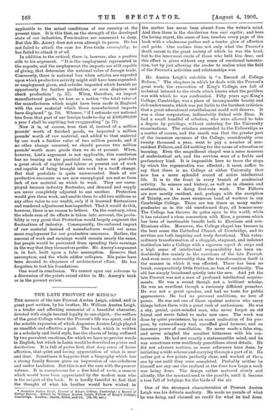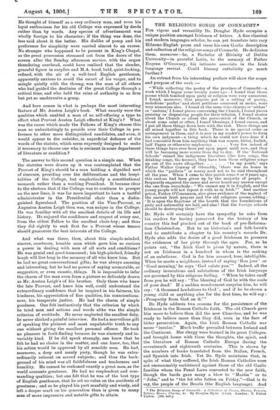THE LATE PROVOST OF KING'S.* THE memoir of the late
Provost Austen Leigh, edited, and in great part written, by his brother, Mr. William Austen Leigh, is a tender and affecting memorial of a beautiful character, devoted with single-hearted loyalty to one object,—the welfare of the great College where the Provost's life was spent, and in the notable expansion of which Augustus Austen Leigh played so unselfish and effective a part. The book, which is written in a scholarly and lucid style, has the charm of being suffused by two prevalent emotions, for which we have no precise words in English, but which in Latin would be described as pietas and desiderium. It is full of pietas first, that deep sense of home affection, that quiet and loving appreciation of what is near and dear. Sometimes it happens that a biography which has a strong family flavour gives an impression of one-sidedness and undue laudation. But this is not the case with the present volume. It is conspicuous for a fine kind of taste, a reserve which would have been appreciated by the modest man who is the subject of the book. It is hardly fanciful to feel that the thought of what his brother would have wished in
* Augustus Austen Leigh, Provost of King's College, Cambridge: a Record of College Reform. Edited by William Austen Leigh, Fellow of King's College, Cambridge, London: Smith, Elder, and Co. [88. 6d. net.]
the matter has never been absent from the writer's mind. And then there is the desiderium tam cari capitis; and here the loving regret, the sense of loss, touches every page of the book with a wholesome pathos and a tender glow of affection and pride. One realises thus not only what the Provost's death meant to the great society of which be was the head, but to the innermost circle of those who held him dear, and this effect is given without any sense of emotional lamenta- tion, but by just allowing the reader to realise what the field of the Provost's activities and relationships was.
Mr. Austen Leigh's sub-title is "a Record of College Reform." The chapters in which he deals with the Provost's great work, the renovation of King's College, are full of technical interest to the circle which knows what the problem was with which he was confronted. Fifty years ago King's College, Cambridge, was a place of incomparable beauty and rich endowments, which was yet liable to the harshest criticism that a great educational establishment could well deserve. It was a close corporation, indissolubly linked with Eton. It had a small handful of scholars, who were allowed to take a degree by privilege, without entering for the University examinations. The scholars succeeded to the Fellowships as a matter of course, and the result was that the greater part of the immense revenues of the College, considerably over twenty thousand a year, went to pay a number of non- resident Fellows, and did nothing for the cause of education or learning. Even the magnificent chapel was a mere museum of ecclesiastical art, and the services were of a feeble and perfunctory kind. It is impossible here to trace the steps by which the regeneration was effected ; it must suffice to say that there is no College at either University that now has a more splendid record of active intellectual life. It is to the front in every branch of academical activity. In science and history, as well as in classics and mathematics, it is doing first-rate work. The Fellows are now mostly resident, and, perhaps with the exception of Trinity, are the most strenuous band of workers in any Cambridge College. There are ten times as many under- graduates as in the old unreformed days, all honour-men- The College has thrown its gates open to the world, while it has retained a close connection with Eton, a process which has been of inestimable benefit both to Etonians and non- Etonians alike. Moreover, the College chapel has become in the best sense the Cathedral Church of Cambridge, and its services are both inspiring and truly devotional. This extra- ordinary transformation of a sluggish, stagnant, and indolent institution into a College with a vigorous esprit de corps and a high sense of intellectual responsibility has been un- doubtedly due mainly to the exertions of the late Provost. And even more noteworthy than the transformation itself is the manner in which it was effected. There has been no break, comparatively little friction, no loss of continuity. The old has simply broadened quietly into the new. And yet the late Provost was not a man of profound intellectual acquire- ments. He was a sound though not a brilliant scholar. He was an excellent though a curiously diffident preacher. He was not a great speaker, and had no taste for public appearances. He had no personal ambitions, no love of power. He was not one of those opulent natures who carry things before them with a great rush of enthusiasm. He was a shy, genial, quiet-minded man, who never forgot an old friend and never failed to make new ones. The work was done by quiet persistence, by an exact realisation of his pur- pose, by extraordinary tact, unruffled good humour, and an immense power of conciliation. He never made a false step, and never mingled the smallest bitterness with his con- troversies. He had not exactly a statesmanlike mind, and he was sometimes even needlessly punctilious about details. He did not advance matters, as some reformers have done, by initiating a wide scheme and carrying through a part of it. He rather got a few points perfectly clear, and worked at them one by one until they were completed. Probably neither he himself nor any one else realised at the time how large a wak was being :done. The design rather matured slowly and silently, like the mustard-seed in the parable, until it became a tree full of lodgings for the birds of the air.
One of the strongest characteristics of Provost Austen Leigh was his delicate modesty. He made no parade of what he was doing, and claimed no credit for what he had done. He thought of himself as a very ordinary man, and even his loyal enthusiasm for his old College was expressed by deeds rather than by words. Any species of advertisement was wholly foreign to his character; if the thing was done, the less said about it the better. His dislike of pomp and his preference for simplicity were carried almost to an excess. No stranger who happened to be present in King's Chapel, as the great procession streamed out from the doors of the screen after the Sunday afternoon service, with the organ thundering overhead, could have realised that the slender, graceful figure in surplice and M.A. hood, bald, quiet-looking, refined, with the air of a well-bred English gentleman, apparently anxious to avoid the escort of his verger, and to mingle quietly with the throng, was the man of all others who had guided the destinies of the great College through a critical time, and who held the reins of authority in so firm but yet so unobtrusive a grasp.
And here comes in what is perhaps the most interesting feature of Mr. Austen Leigh's book. What exactly were the qualities which enabled a man of so self-effacing a type to effect what Provost Austen Leigh effected at King's ? What was the cause which made the Fellows of King's choose this man so unhesitatingly to preside over their College in pre- ference to other more distinguished candidates, and even, it would appear to the outsider, in superficial defiance of the words of the statute, which seem expressly designed to make it necessary to choose one who is eminent in some department of literature or erudition ?
The answer to this second question is a simple one. When the statutes were drawn up it was contemplated that the Provost of King's should be a man holding a dignified sort of sinecure, presiding over the deliberations and the hospi- talities of the College, but emphatically a constitutional monarch rather than a working President. It became clear to the electors that if the College was to continue to prosper on the new lines, it was far more important to have a tactful administrator in the Presidential chair than a distin- guished figurehead. The position of the Vice-Provost, as Augustus Austen Leigh then was, was unique in the College. He was familiar with all the smallest details of its life and history. He enjoyed the confidence and respect of every one, from the oldest Fellow to the smallest choir-boy; and thus they did rightly to seek first for a Provost whose tenure should guarantee the best interests of the College.
And what was there, then, about this simple-minded, sincere, courteous, humble man which gave him so curious a power in dealing with men of all sorts and conditions ? He was genial and good-humoured; his high-pitched, friendly laugh will live long in the memory of all who knew him, But be bad no great conversational gifts; he was always amusing and interesting, but he had no power of saying memorable, or suggestive, or even caustic, things. It is impossible to infer the charm of the man even from a picture so delicately drawn as Mr. Austen Leigh's of his brother. Only those who knew the late Provost, and knew him well, could understand the extraordinary confidence that he inspired in his fairness, his kindness, his appreciation of fine qualities, his conscientious- ness, his temperate justice. He had the charm of simple goodness. One felt instinctively that the criterion by which he tried men and actions and words alike was the simple criterion of rectitude. He never neglected the smallest duty, be never shirked a painful interview. He hada marvellous gift of speaking the plainest and most unpalatable truth to any one without giving the smallest personal offence. He took no pleasure in fault-finding because he was sincerely and in- variably kind. If he did speak strongly, one knew that he felt he had no choice in the matter, and one knew, too, that his action would be approved by all sensible men. He. had, moreover, a deep and manly piety, though he was extra- ordinarily reticent on sacred subjects; and thus the back- ground of his mind was all faithfulness and tenderness and humility. He cannot be reckoned exactly a great man, as the world accounts greatness. He had no resplendent and com- manding qualities; but one felt that he was of the best type of English gentleman, that he set no value on the accidents of greatness ; and so he played his part manfully and wisely, and left a deeper mark on his generation than is given to many men of more impressive and notable gifts to attain.







































 Previous page
Previous page